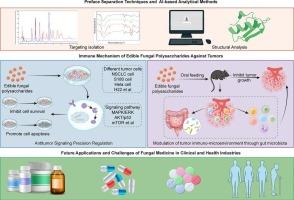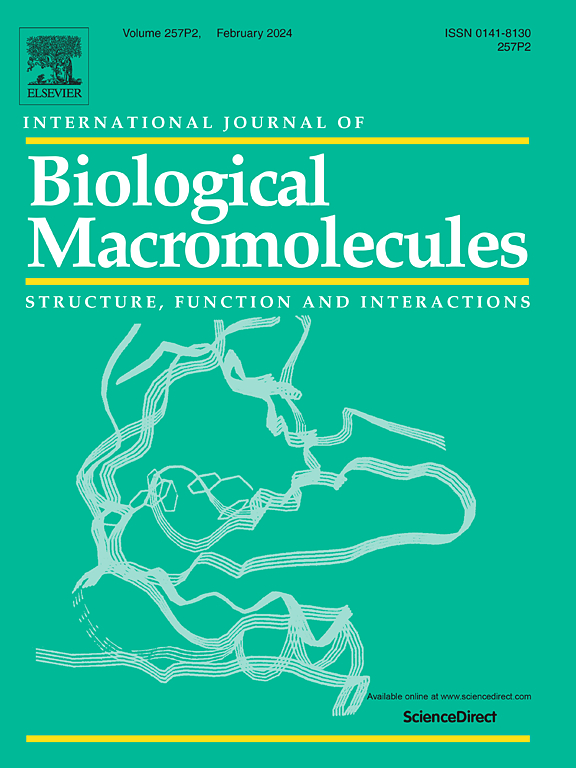食用菌多糖的靶向分离和基于人工智能的分析:强调肿瘤免疫机制和作为真菌药物的未来前景。
IF 8.5
1区 化学
Q1 BIOCHEMISTRY & MOLECULAR BIOLOGY
International Journal of Biological Macromolecules
Pub Date : 2025-01-01
DOI:10.1016/j.ijbiomac.2024.138089
引用次数: 0
摘要
食用真菌多糖是一种重要的生物活性化合物,具有多种治疗潜力,包括显著的抗肿瘤作用。这些多糖来源于各种真菌,具有复杂的生物活性,如抗氧化、免疫调节、抗炎和抗肥胖等特性。在癌症治疗中,该家族成员通过诱导细胞凋亡和调节免疫系统等机制,有望抑制肿瘤生长和转移。本综述详细介绍了有针对性地分离和阐明食用真菌多糖结构的现代技术。此外,综述还重点介绍了先进人工智能(AI)方法的应用,以促进对这些多糖进行高效、准确的结构分析。综述还探讨了这些多糖与肿瘤微环境中免疫细胞的相互作用,以及它们在调节肠道微生物群方面的作用,这可以增强整体免疫功能,并有可能降低癌症风险。临床研究进一步证明了它们在各种癌症治疗中的功效。总之,食用真菌多糖是癌症治疗领域前景广阔的前沿领域,利用其天然来源和最小毒性,为癌症综合治疗提供了新的策略。本文章由计算机程序翻译,如有差异,请以英文原文为准。

Targeted isolation and AI-based analysis of edible fungal polysaccharides: Emphasizing tumor immunological mechanisms and future prospects as mycomedicines
Edible fungal polysaccharides have emerged as significant bioactive compounds with diverse therapeutic potentials, including notable anti-tumor effects. Derived from various fungal sources, these polysaccharides exhibit complex biological activities such as antioxidant, immune-modulatory, anti-inflammatory, and anti-obesity properties. In cancer therapy, members of this family show promise in inhibiting tumor growth and metastasis through mechanisms like apoptosis induction and modulation of the immune system. This review provides a detailed examination of contemporary techniques for the targeted isolation and structural elucidation of edible fungal polysaccharides. Additionally, the review highlights the application of advanced artificial intelligence (AI) methodologies to facilitate efficient and accurate structural analysis of these polysaccharides. It also explores their interactions with immune cells within the tumor microenvironment and their role in modulating gut microbiota, which can enhance overall immune function and potentially reduce cancer risks. Clinical studies further demonstrate their efficacy in various cancer treatments. Overall, edible fungal polysaccharides represent a promising frontier in cancer therapy, leveraging their natural origins and minimal toxicity to offer novel strategies for comprehensive cancer management.
求助全文
通过发布文献求助,成功后即可免费获取论文全文。
去求助
来源期刊
CiteScore
13.70
自引率
9.80%
发文量
2728
审稿时长
64 days
期刊介绍:
The International Journal of Biological Macromolecules is a well-established international journal dedicated to research on the chemical and biological aspects of natural macromolecules. Focusing on proteins, macromolecular carbohydrates, glycoproteins, proteoglycans, lignins, biological poly-acids, and nucleic acids, the journal presents the latest findings in molecular structure, properties, biological activities, interactions, modifications, and functional properties. Papers must offer new and novel insights, encompassing related model systems, structural conformational studies, theoretical developments, and analytical techniques. Each paper is required to primarily focus on at least one named biological macromolecule, reflected in the title, abstract, and text.

 求助内容:
求助内容: 应助结果提醒方式:
应助结果提醒方式:


